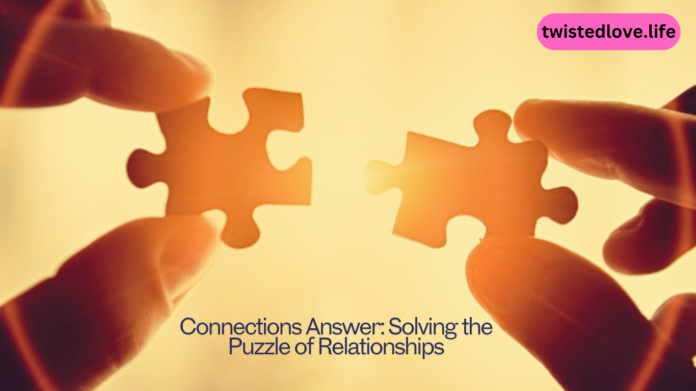Introduction: Why Relationships Matter
Connections Answer: Solving the Puzzle of Relationships are the threads that weave our lives together, forming the tapestry of who we are. They shape our experiences, bring joy, and sometimes present challenges. Why do they matter so much? Simply put, they’re the essence of human connection.
The Role of Relationships in Personal Growth
Ever felt like someone pushed you to be a better version of yourself? That’s the magic of relationships. They often challenge our comfort zones, teaching us lessons we’d never learn alone.
Relationships as a Source of Joy and Challenges
Connections Answer, While relationships can light up our lives with joy, they also come with their fair share of bumps. From misunderstandings to misaligned priorities, the journey is as much about overcoming hurdles as it is about celebrating connections.
Understanding Different Types of Relationships
Family Connections
Family relationships are our first bonds. These connections often provide a foundation of love, care, and values, shaping who we become.
Friendships and Their Importance
Friends are the family we choose. They offer companionship, share laughter, and stand by us in our toughest times. Good friends can feel like anchors in life’s stormiest seas.
Romantic Relationships
Love is a many-splendored thing, but romantic relationships require effort. They thrive on trust, mutual respect, and a deep understanding of each other’s needs.
Professional Relationships
Ever heard the phrase “It’s not what you know, but who you know”? That’s the power of professional connections, where collaboration and respect can fuel career growth.
The Puzzle of Relationships
Why Are Relationships So Complex?
Relationships are like puzzles, with each person bringing their unique piece. Differences in personalities, communication styles, and expectations make fitting these pieces together a challenge.
Communication: The Missing Piece
Have you ever misread someone’s text? Miscommunication often creates gaps in relationships. Clear, honest dialogue can bridge these divides.
Emotional Intelligence: The Key to Understanding
Understanding emotions—yours and others—is like having a map for this puzzle. Emotional intelligence helps navigate the labyrinth of feelings, leading to stronger bonds.
Building Strong Connections
The Art of Active Listening
Listening is more than just hearing words; it’s about understanding the emotions behind them. Active listening shows you care and builds trust.
Empathy: Walking in Someone Else’s Shoes
Empathy is a superpower in relationships. It’s about feeling what others feel and responding with kindness.
Setting Boundaries and Respecting Others’ Space
Healthy boundaries are the guardrails of relationships. They ensure mutual respect and prevent feelings of being overwhelmed or undervalued.
Navigating Conflicts in Relationships
Common Causes of Disputes
Misunderstandings, unmet expectations, and lack of communication often spark conflicts. Recognizing these triggers is the first step in managing them.
Healthy Ways to Resolve Conflicts
Conflict resolution isn’t about winning; it’s about finding solutions that work for everyone. Open dialogue, patience, and compromise are your best tools.
Knowing When to Walk Away
Connections Answer, Some relationships aren’t meant to last. Recognizing toxicity and knowing when to let go is vital for your well-being.
Sustaining Long-Term Relationships
The Importance of Consistency
Trust is built over time with consistent actions. Reliability strengthens the bond between people.
Adapting to Life’s Changes Together
Life is a series of changes. Relationships that grow together through these transitions become unshakable.
Celebrating Milestones and Growth
Whether it’s anniversaries, promotions, or small victories, celebrating milestones adds joy and reinforces your connection.
Conclusion
Connections Answer Solving the puzzle of relationships isn’t about finding perfection—it’s about cherishing the imperfections and working together to build something beautiful. With communication, empathy, and mutual effort, you can create connections that stand the test of time.
FAQs
What makes a strong relationship?
Strong relationships are built on trust, open communication, mutual respect, and shared goals. Consistency and emotional support also play significant roles.
How do you fix a broken connection?
Start with honest communication. Acknowledge mistakes, express your feelings, and work together on rebuilding trust and understanding.
Can a relationship survive without trust?
Trust is the foundation of any relationship. Without it, maintaining a healthy connection becomes challenging and often unsustainable.
What role does self-care play in relationships?
Self-care ensures you’re emotionally and physically ready to contribute positively to your relationships. You can’t pour from an empty cup.
How do you identify toxic relationships?
Toxic relationships often involve constant negativity, manipulation, lack of support, and disrespect. Recognizing these signs can help you take steps to protect your well-being.

